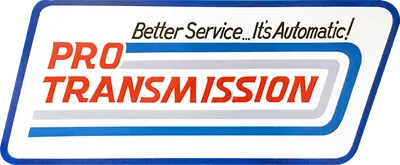HERE’S WHAT YOU DON’T KNOW ABOUT TRANSMISSIONS
Well over half of the transmission problems we treat are not caused by the transmission. Why? Vehicles made in the last decade particularly are more like a rocket than a Model T. The experts at Pro Transmission are highly skilled to understand, diagnose, and fix the underlying issues in your vehicle.
Have a look at our glossary here for some common terminology on today’s vehicles. Then call or come by the shop for your free road and service check, and get those repairs made sooner not later to get your vehicle working safely again!
AC – The Air Conditioning sensor indicates whether the A/C clutch is on or off. The computer uses this signal to adjust engine idle speeds. A failure can cause a number of problems that appear to be transmission related.
Brake – The Brake On-OFF switch indicates whether the brake is applied or released. The computer usually uses the signal to control the converter clutch; a failed BOO switch can prevent lockup, or may cause the car to chuggle when coming to a stop.
CT – The Coolant Temperature sensor measures engine coolant temperature. It’s used to inhibit overdrive and the converter clutch when the engine is too cold. When it fails, it can result in no overdrive or converter clutch. It also affects engine performance.
DSS – The Differential Speed Sensor creates a signal the computer can use to measure vehicle speed. A DSS failure can prevent the transmission from shifting, or cause late, harsh shifts. It may also inhibit the converter clutch or overdrive.
IAT – The Intake Air Temperature sensor provides a signal based on the temperature of the air entering the engine. The computer uses this signal to modify engine air / fuel mixtures. A failure can cause the transmission to shift harder than normal.
MAS – The Mass Airflow Sensor measures airflow into the engine and is used to determine engine load. When it fails, it can cause late, harsh shifts, early / soft shifts, or it can result in no shifts at all. It also affects engine performance.
MAP – The Manifold Absolute Pressure sensor creates a signal based on vacuum levels in the intake manifold, which indicates engine load. A faulty MAP sensor can cause late, harsh shifts, early / soft shifts, or even prevent the transmission from shifting at all.
OD – The Overdrive Switch allows the driver to disable overdrive. Depending on how it fails, the transmission may not shift into overdrive, or the driver won’t be able to disable overdrive.
PCM – The Powertrain Control Module controls the engine and transmission functions. It is responsible for all shift timing and shift feel characteristics. When the PCM fails, the transmission can stop shifting, shift harsh or soft, or cause complete transmission failure. Some vehicles use TCM (transmission control module) rather than PCM. Most vehicles have several modules: some have over ten. Often, other modules like BCM play a role in transmission function.
TFT – The Transmission Fluid Temperature sensor creates a signal based on transmission operating temperature. The computer uses this signal to alter or inhibit certain gear ranges under cold or overheated operating conditions. A failure can cause wrong gear starts, late shifts, or prevent overdrive or converter clutch apply.
TP – The Throttle Position sensor creates a signal based on how far you're pressing the gas pedal; an indication of vehicle load. A faulty TP sensor can cause late, harsh shifts, early / soft shifts, or even prevent the transmission from shifting at all.
TR – The Transmission Range sensor indicates the position of the gearshift lever; the computer uses this to enable or disable. A failed TR sensor can cause wrong gear starts, prevent upshifts, or cause the transmission to seem like its falling out of gear.
TSS – The Turbine Shaft Speed sensor creates a signal based on the rotating speed of the transmission input shaft. From this, the computer can verify gear ranges, or determine whether the transmission is slipping. A failure can cause any number of shift timing or shift quality problems.
VSS – The Vehicle Speed Sensor creates a signal based on road speed. A VSS failure can prevent the transmission from shifting, or cause late, harsh shifts. It may also inhibit the converter clutch or overdrive.
BROWSE OUR WEBSITE
CONTACT INFORMATION
Phone: 269-925-5026
Email: roningram1@comcast.net
Address: 2127 Michigan 139, Benton Harbor, MI, 49022
Business Hours:
- Mon - Fri
- -
- Sat - Sun
- Closed







